TERMS OF USE: There is a chance that some of the content on this page has changed since it was last updated. By reading this article, you consent to our Terms of Use and Disclaimer. Happy Travels!
DISCLOSURE: Some of our posts may contain affiliate links which we may receive a commission if you choose to book something through one of our links.
These are some of the most famous traditional Panama food dishes that everyone needs to try to give you a real flavor of this stunning country.
You know, we’ve heard it said that there’s a restaurant at the end of the universe… But for us, we would much rather explore the foodie paradise that is the Crossroads of the World!
Let us start by saying that Panama has gone above and beyond to earn their lofty title of being a crossroads. Honestly, the multicultural background of this tropical paradise unfolds everywhere you look – and it does so in ways you might not have ever imagined.
Speaking from personal experience, we found ourselves most shocked by the food. Nobody had ever told us about the wonders of traditional Panamanian cuisine!
Whether we decided to sit down and treat ourselves to a complete meal or venture into the exciting realm of fast street food, our time in Panama was consistently marked by tempting gastronomic choices. We traveled a great deal around Panama during our big trip in Latin America, from Panama City up to Bocas del Toro, and back. Along the way, we tried lots of different Panamanian foods and drinks.
This is precisely why we chose to highlight our favorite traditional dishes with a comprehensive guide! Here you will find all the details on what to eat during your next grand trip to the tantalizing country of Panama.
How did Panamian food originate?
In 1501, the Spanish discovered the area now known as Panama. With these Spaniards came enslaved Africans (who essentially created the country). Then, in 1821, this region was unified with Colombia, Ecuador, and Venezuela to be called “Gran Colombia“.
This is why there is a lot of similarity and overlap with the traditional foods of Colombia, Ecuador, and Venezuela. A few years later, Chinese and Indian people came to work on the Panama Canal. Eventually, Americans came over and took control of the build.
And that’s just a brief synopsis of Panama's fascinating history! We could easily dive deeper into the subject… However, our goal here was to demonstrate the lasting impact of these various cultures on the country, primarily through food. You see, the majority of traditional Panamanian cuisine is based on techniques and ingredients from African, Spanish, and Native American peoples. The entirety of their cooking style would be best described as a wild, fun mix of everything under the sun!
Of course, these traditional foods are significantly impacted by the naturally occurring vegetation on the tropical isthmus. Commonly used ingredients include yucca, plantains, and maize. There is also an abundance of sublime, fresh seafood everywhere you turn.
Certain Panamanian dishes may seem to be copied from other cultures. Still, it’s important to note that there is usually a unique twist that makes these meals simply Panama!
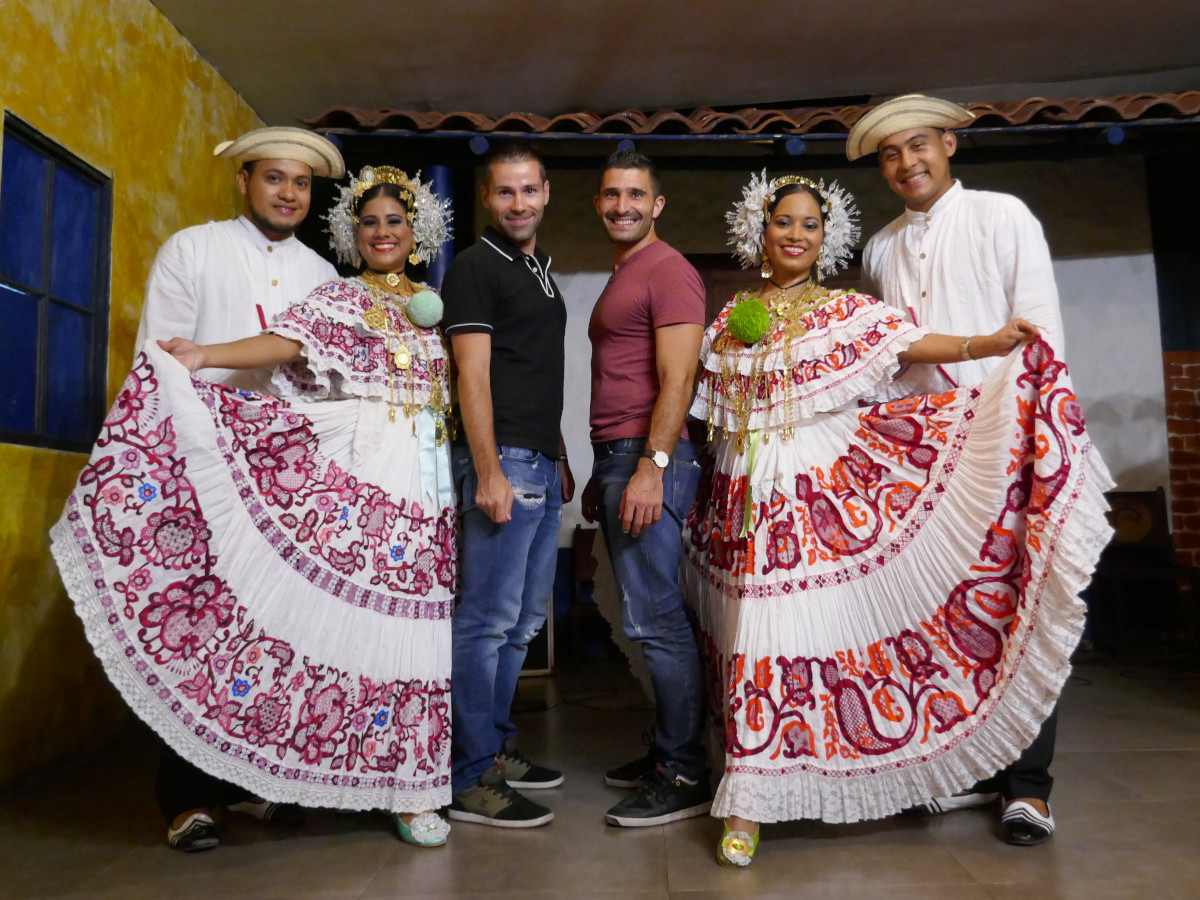
1. Sancocho de gallina Panameño: the National dish
Had a few too many drinks out partying in the bars of Casco Viejo? A Sanchocho is the perfect hangover cure…this delicious hearty chicken soup will ease that head in no time!
Sancocho is a super tasty, light chicken soup with potatoes, cilantro herb (similar to cilantro but stronger in flavor), yuca, and plantains. Other ingredients often used include corn on the cob (mazorca), ñampi (a tropical root vegetable), hot sauce, chopped onions, garlic, and oregano.
The traditional recipe of sancocho is from the Azuero region of Panama, but other regions have their own variations. Due to the varied ingredients used to make a sancocho, it is often used as a metaphor for Panama's racial diversity, showing that each part has just an important and equally important role to play in the preparation of this very yummy dish.
And that's why it's also considered the national dish of Panama!
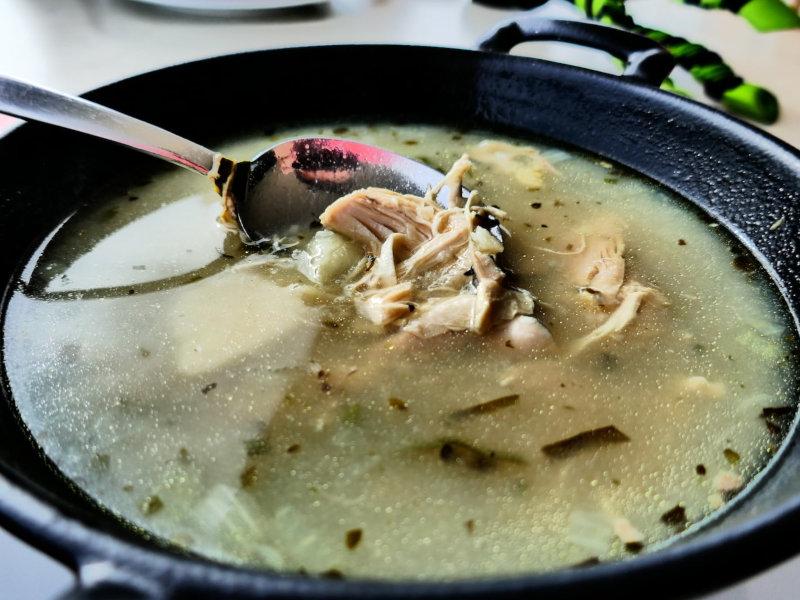
2. Ropa vieja: slowly cooked old clothes!
We first came across this dish when traveling in Gran Canaria. If you understand Spanish, this dish will always bring a smile to your face – it literally means old clothes. Ropa vieja is a beef stew with spices like black pepper, cumin, and oregano.
The name for this unique dish comes from a legend that a poor old man was so desperate to feed his family that he shredded and cooked the clothes he was wearing (which were obviously very old!). As the pot with the clothes simmered away, the man prayed. Then, his prayers were answered and the clothes were transformed into a generous meal of meat and vegetables to feed his hungry family.
Old clothes or not, the ropa vieja we tried in Panama City was delicious and definitely a dish to look out for!
Note that ropa vieja is also very popular across other countries in the Americas, particularly in Cuba where it is considered the National Dish.
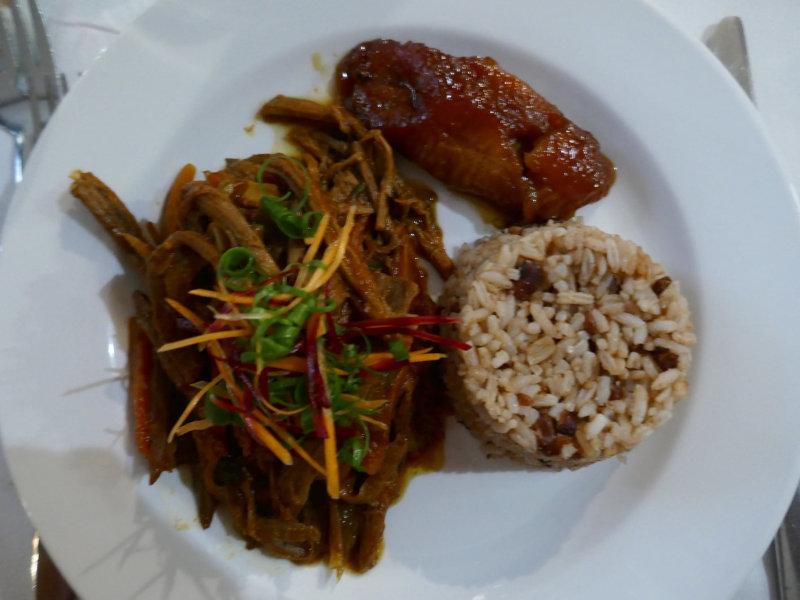
3. Panamanian tortillas: thick corn cakes
Tortillas are also common throughout the Americas – each country with its own unique twist. Panamanian tortillas are thicker, circular, and made from corn dough. Tortillas are a native indigenous American dish dating back centuries, hence their prevalence across the entire continent. For example, in 1631, famous explorer Diego Ruiz de Campos wrote about the consumption of tortillas by the Native American inhabitants in the villages near the Caimito River.
In Panama, tortillas are mainly eaten for breakfast, usually topped with melted cheese or eggs. We had many delicious tortillas during our travels across Panama. We found them to be quite similar to Colombian arepas, which are also a type of corn cake.
Panamanian tortillas are usually deep-fried (tortillas fritas), although they can also be grilled (tortillas asadas) to make them slightly healthier. They are often compared to pancakes because the cooking process involves flipping them in the skillet to ensure both sides brown equally.
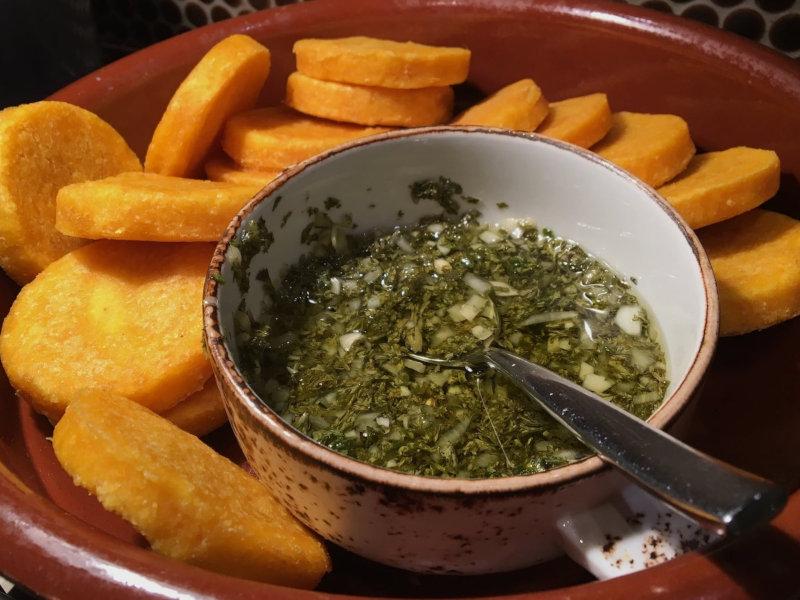
4. Carimañolas: stuffed yuca fritters
Yuca is one of the most commonly used ingredients in Panamanian dishes. For that reason, there are various different ways it can be cooked. But with that being said, we have to admit that yuca frita (or carimañolas) is our fave.
As a starchy root vegetable, we would say that yuca most similarly resembles a lighter, less savory potato. To make yuca frita, it is essentially the same process one might follow to make french fries. The veggie is first cut into thick chunks before it is simmered until just tender.
Then, the yuca pieces are fried until they reach a perfect golden hue. This cooking style ensures that the outsides will stay crisp while the inside remains a soft, chewable texture. The end result will be a torpedo-shaped bundle of yumminess.
While it is recommended that yuca frita be eaten as a side dish, it is also commonly eaten at breakfast in Panama – stuffed with cheese and/or seasoned ground beef…we swear we could eat a whole plate as a meal! Especially if we had an aji chile pepper sauce for dipping. Mmm-mmm!
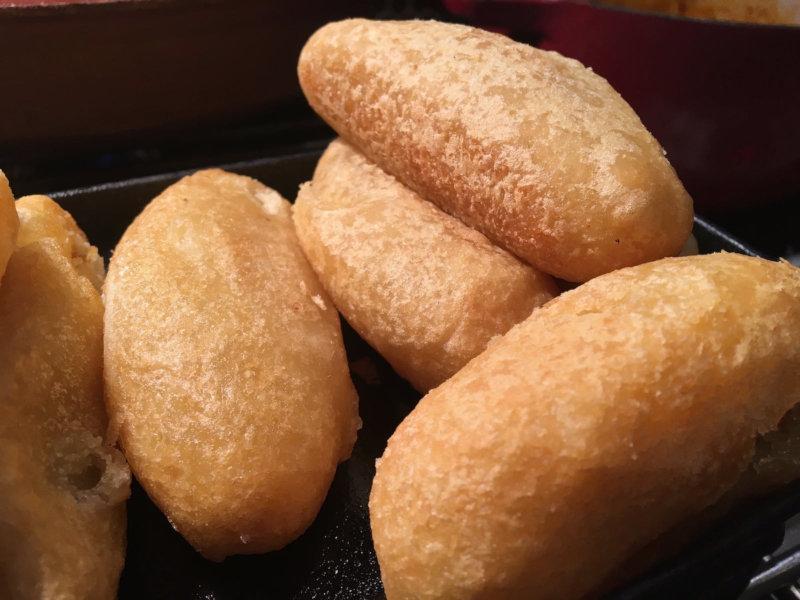
5. Ron Ponche: THE unique Panamanian cocktail
As Panama's signature cocktail, you have not BEEN to Panama until you've had a few of these bad boys!
A Ron Ponche is very similar to eggnog. It is a cocktail of rum mixed with egg yolks, vanilla extract, cinnamon, nutmeg and evaporated milk. A glass of Ron Ponche is sipped slowly, just like you would drink a glass of Bailey's or eggnog. You can use any kind of rum to try the recipe out for yourself, but if you can get your hands on some traditional rum made in Panama, then even better!
Ron Ponche is popular during the Christmas holidays in Panama and in many other countries across Latin America. For example, in Venezuela and the Dominican Republic, it is called “Ponche”, in Puerto Rico, it is called a “Coquito” (with coconut cream added), in Chile, it is a “Cola de Mono” and in México it is known as “Rompope”.
6. Hojaldras: deep-fried fritters
Hojaldras is the Panamanian equivalent to fried bread. It is a delicious dish usually served for breakfast across the country.
To prepare, the hojaldras dough needs to sit overnight before cooking, making it ideal for a lazy weekend brunch! To serve, they are very versatile as you can put anything on them. Some of the tastiest varieties we've tried included a fried egg and cheese slices.
Non-savory versions are also possible with just sugar. They reminded us a lot of French toast or pancakes, particularly when served with a few slices of bacon on the side.
In Panama, the most traditional way to eat hojaldras is at breakfast, served with huevos fritos, steak, black beans, or salchichas in tomato sauce. When you walk down a small town's city center in Panama in the morning hours, you'll quickly pick up the scent of freshly baked hojaldras!
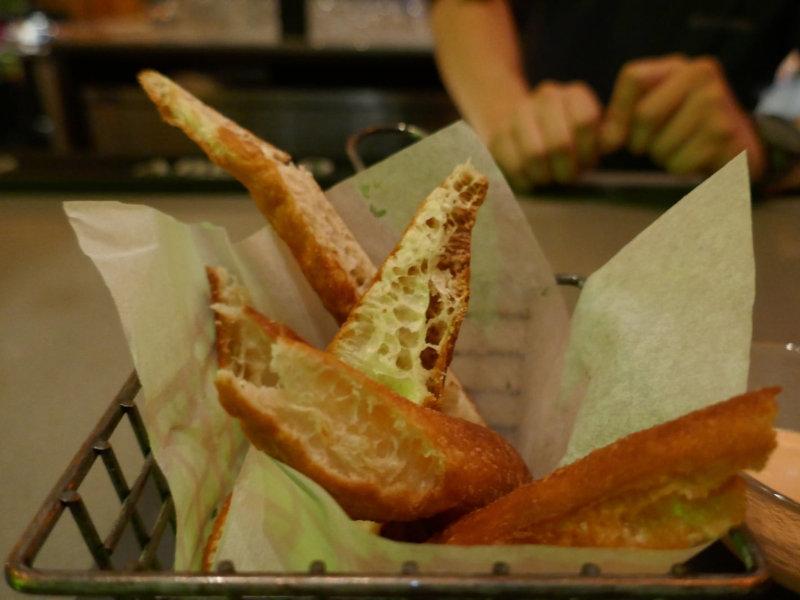
7. Patacones: fried banana chips
Patacones are fried green plantain slices made with green plantains – the Panamanian version of fries or potato chips. They are made by slicing up non-ripe plantains and then deep-frying them a few times until they become really crispy. After the first frying, the slices of plantain are patted down, flattened before being fried again. Afterward, they are salted, which is what gives them a banana-chips-type flavor.
Noted that while plantains look a lot like bananas, they're actually the starchier cousin of bananas usually used for cooking rather than as a fruit snack we buy in our local supermarket.
Patacones are popular throughout the Americas where they are more commonly referred to as tostones (although in Ecuador and Peru they are called chifles). This word comes from the Spanish “tostar” , which means to toast, which refers to the cooking process of toasting them several times in lots of oil to get them crunchy.
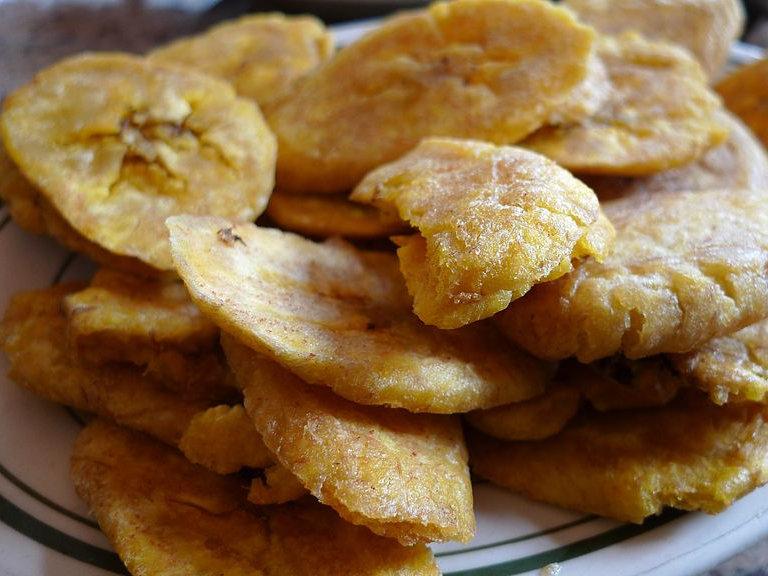
8. Balboa Beer: Panama's first and finest
There are three main beers produced in Panama, but Balboa beer is the one that's been around the longest. It is also the one we liked the most, mainly because as a pale lager, a nice freshly-chilled Balboa is THE best refreshment to enjoy in the pretty intense Panamanian humidity!
First brewed in 1910 by the Panama Brewing & Refrigerating Company, “The Balboa” is not as popular with locals as the other two beers – called “Panama” and “Atlas”. Interestingly, the Panama and Balboa beers have 4.8% alcohol, whereas the Atlas' is 3.8% – bear that in mind if you're looking for a cheap buzz!
Balboa takes its name from the Spanish explorer, Vasco Núñez de Balboa, who famously discovered the Pacific Ocean back in 1513. It is also name we saw being used throughout Panama for different things. For example, it's the name of the currency (before the USD dollar was formally adopted), there's a Balboa statue overlooking the Panama Bay in Panama City, and it's also a seaport at the Pacific terminus of the Panama Canal.
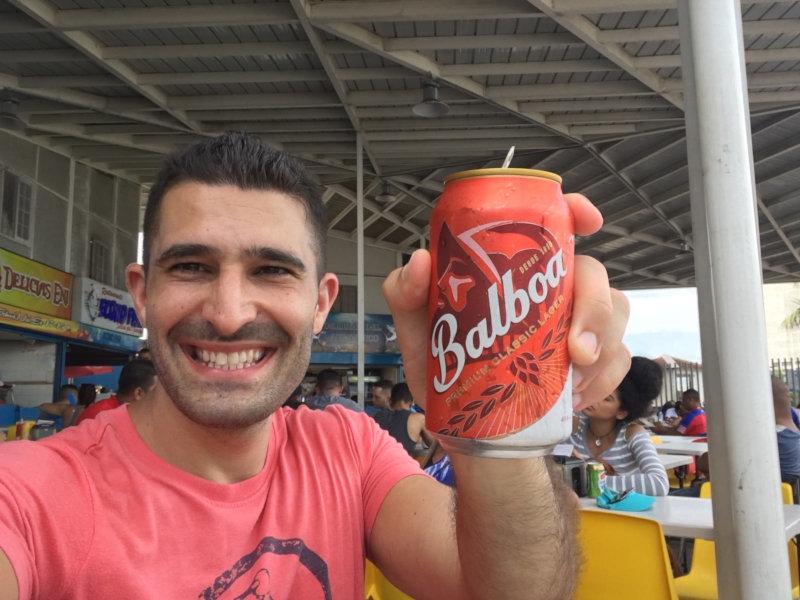
Cocadas are these yummy little coconut cookies that are popular in many parts of Latin America, particularly in Panama. In Panama, they are made using sweetened condensed milk (instead of eggs) and topped with plenty of shredded coconut. They are oven-baked but served at room temperature to provide their chewy and soft texture that we love so much!
While they often just look a slightly golden color like in the photo, sometimes food coloring is used to make them a bit fancy, along with additions like almonds or bits of dried fruit. You can also add flavors like chocolate, cinnamon, coffee, dulce de leche, lime, or even orange. No matter how they're prepared, they're always a little bite of deliciousness – they reminded us a lot of macaroons.
We saw lots street stalls selling freshly baked cocadas in Panama City and in Bocas del Toro, as well as packaged boxes of it in souvenir shops – it's actually quite a rewarding gift to bring back home with you.
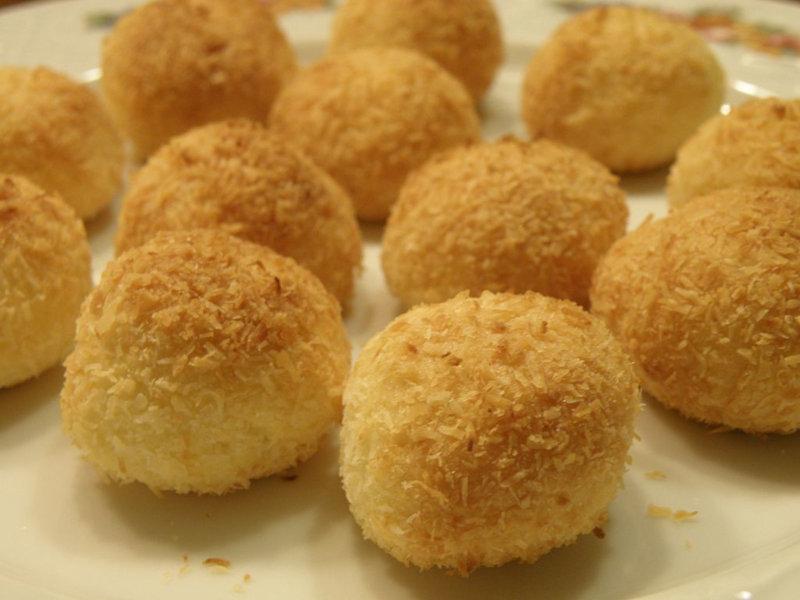
10. Tamales: the Panamanian version!
There’s something about the word casserole that is just… Off-putting. It’s hard to put the feeling into words, but we can only assume it’s due to bad associations with other dishes. All we can say now is thank goodness this delicious meal has a better name than tamale casserole!
Because, at its base, that is really the best way to describe tamal de olla. The name literally translates to “tamale of the pan” because of the cooking method. Unlike a normal tamale, these are not wrapped in any leaves or peels.
Instead, they are packed tightly into a baking dish and placed in the oven to cook. If it’s not something you’re used to, the concept may sound odd. We totally understand any hesitation you might have. Still, after trying the recipe for ourselves, we are officially tamal de olla stans.
With simple ingredients like chicken, onions, peppers, capers, and olives… It’s kind of hard to go wrong!
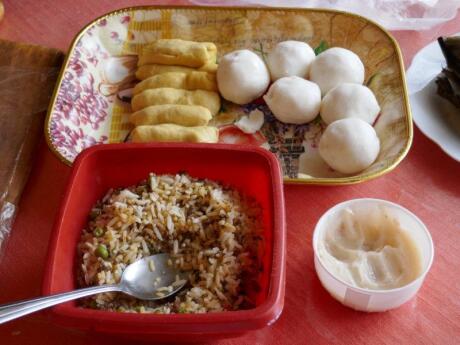
11. Chicheme: sweet corn drink
We know what you're thinking, “a sweet corn drink? Yuck!” But hear us out…this drink is completely unique to Panama and is surprisingly delicious as well as very refreshing.
A chicheme is a non-alcoholic drink that is made by boiling corn for a long time, then adding cinnamon, sugar, nutmeg, and evaporated milk. If the corn juice is fermented, it becomes an alcoholic drink called chicha, which is common throughout Latin America, particularly in Andean and Amazonia communities.
Once it's ready you can drink a chicheme warm or served ice cold – recommended in Panama where it's quite humid all year round! A chicheme is also surprisingly filling! The consistency reminded us of a more liquid version of a rice pudding.
The town of La Chorrera just outside of Panama City is said to be where chicheme originated and where locals proudly claim to make the best chicheme in the world!
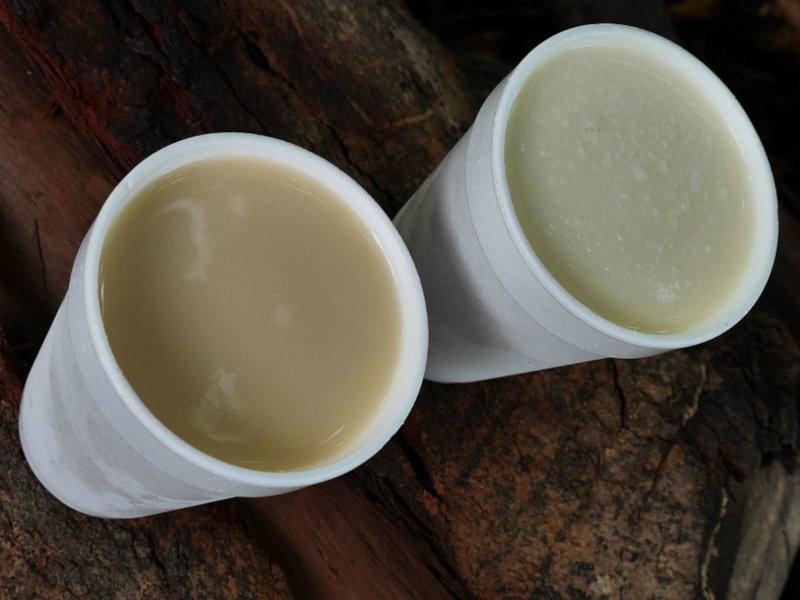

Advice for LGBTQ travellers to Panama
Panama is a very conservative country, with a strong influence from the Catholic Church. Homophobia is therefore prevalent across the country, so do take note of this. However, things are different in the cities, especially Panama City, as well as in other parts of the country where expats from the US and Europe have settled, in particularly Bocas del Toro. Find out more in our gay guide to Panama City and Bocas del Toro.
12. Raspados: shaved ice with condensed milk
Nothing better than a frozen treat to help cool down on unbearably hot days! And trust us, Panama definitely has those days.
But rather than reaching for the stereotypical ice cream or slushie, we recommend moving out of your comfort zone to try something that will surely blow your mind. Panamanian raspados share similar traits with the traditional shaved ice you know and love… but there’s so much more to this dessert than meets the eye.
Not only is it an entertaining spectacle to watch the street vendor create your raspado, but the taste is severely sweet.
Like regular shaved ice, raspados comes with fruit-flavored syrup, like cherry, grape or passion fruit. Then comes a sugary, creamy drizzle of condensed milk to add a whole new depth of flavor and texture. If you can, ask for your raspados to be served with a dollop of malt powder on top to make the delicious delicacy even richer than usual.
13. Sopa borracha: traditional rum cake
Okay, show of hands, who doesn’t love to get a little boozy during dessert? Anyone? Didn’t think so! Now, what if we told you about a treat that could fill you up and get you tipsy at the same time?
Sopa borracha is just the thing to fill those drink cravings while satisfying your sweet tooth. This traditional rum cake is commonly served for special occasions like weddings or birthdays, but you can basically find it anywhere in the country.
The dish is built on a foundation of fluffy sponge cake, cut into little pieces and drenched with a syrupy concoction. That liquid mixture typically consists of dark rum and sherry with a touch of sugar, cinnamon and lemon to add sweetness and warmth. For a final touch, alcohol-soaked raisins and prunes are sprinkled on top for texture.
The cake is simple in its preparation but complex in its flavor profiles, which is exactly why we can’t get enough!
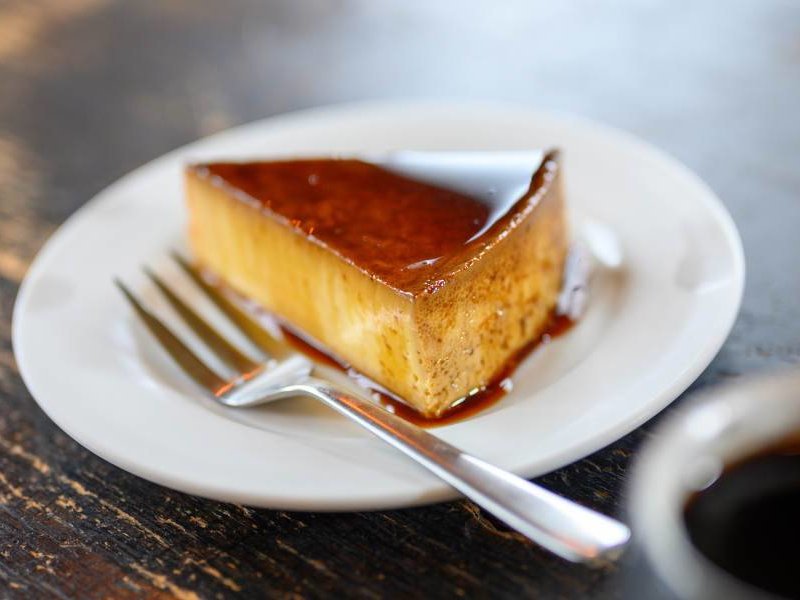
14. Primavera salad: Panamanian vegetarian salad
You all have heard of the classic American dish of pasta primavera, correct? Then prepare to meet its Panamanian cousin!
Assembling the dish is both enjoyable and uncomplicated. To make a Panamanian primavera salad, you’ll first want to cook the pasta of your choice. We personally love the corkscrew shape of fusilli, but you do what makes you happy. From there, it’s veggie time!
While this salad can include any variety of fresh vegetables, the Panamanian version of a primavera salad will typically have iceberg lettuce, peppers, broccoli, asparagus, mushrooms and tomatoes. Combine it all with a dressing of curds and cream, and it is done.
We know we basically just gave you the entire recipe… however, it’s worth noting that feasting on the real deal at a restaurant in Panama is a fantastic experience that you will undoubtedly regret missing. We encourage you to embrace your inner vegetarian and support local businesses during your trip to the isthmus.
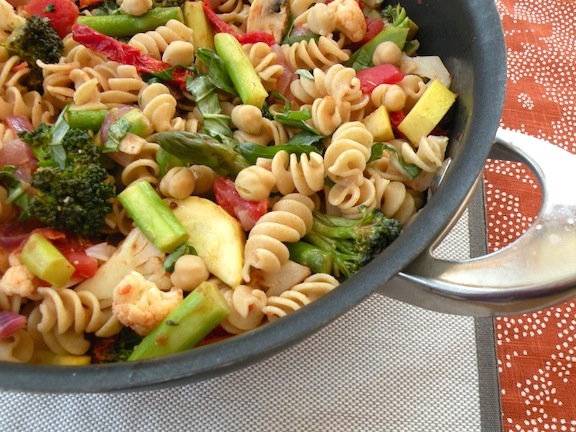
15. Bistec Picado: spicy beef stir fry
There are a handful of words that make our hearts soar when they are spoken about food: exquisite, healthy and straightforward. So, it’s no wonder we would find ourselves discussing the joys of bistec picado!
When it comes to the preparation of bistec picado, it’s hard to say whether the dish better resembles a stew or a stir fry. Chopped meat, chili peppers, onions, bell peppers and a luscious tomato sauce mingle together on a plate.
We personally preferred pairing the meal with a portion of white rice, but we’ve heard that it also goes great with a simple salad. Either way, it’s safe to say that this traditional Panamanian cuisine is warm and nourishing.
During our time in the country, we were happy to wake up with a small plate of bistec picado. However, it was just as great to end our days with the delight of this spicy, fragrant and classic dish.
For more inspiration:
- Make sure you also check out our gay country guide to Colombia
- As well as the best foods to try in Colombia while you're there
- Speaking of, find out what it's like to attend Theatron gay club in Bogota – famous for being the biggest (and best!) gay club in Latin America
- These are the most gay friendly cities in Latin America
- As well as the best gay prides in Latin America you won't want to miss
- Plus, the biggest gay pride events in the world
- If you're going to attend one, get some inspiration for gay pride outfits here
- And make sure you pack these must-have pride accessories so you have a fabulous time!
Like this post? Pin it
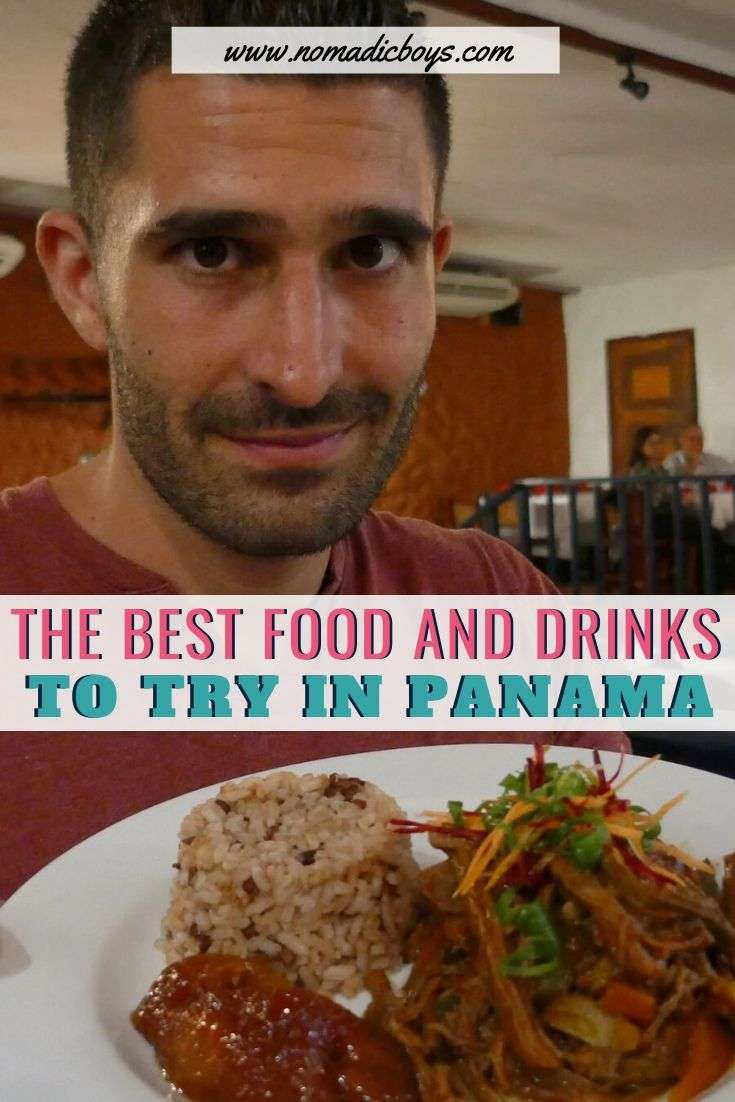
Happy travels are safe travels
We recommend you always take out a reputable travel insurance before your next vacation. What happens if you suffer from illness, injury, theft, or a cancellation? Many travelers forget about it and regret it when something happens. Better to pay a small price and have the peace of mind and not worry.

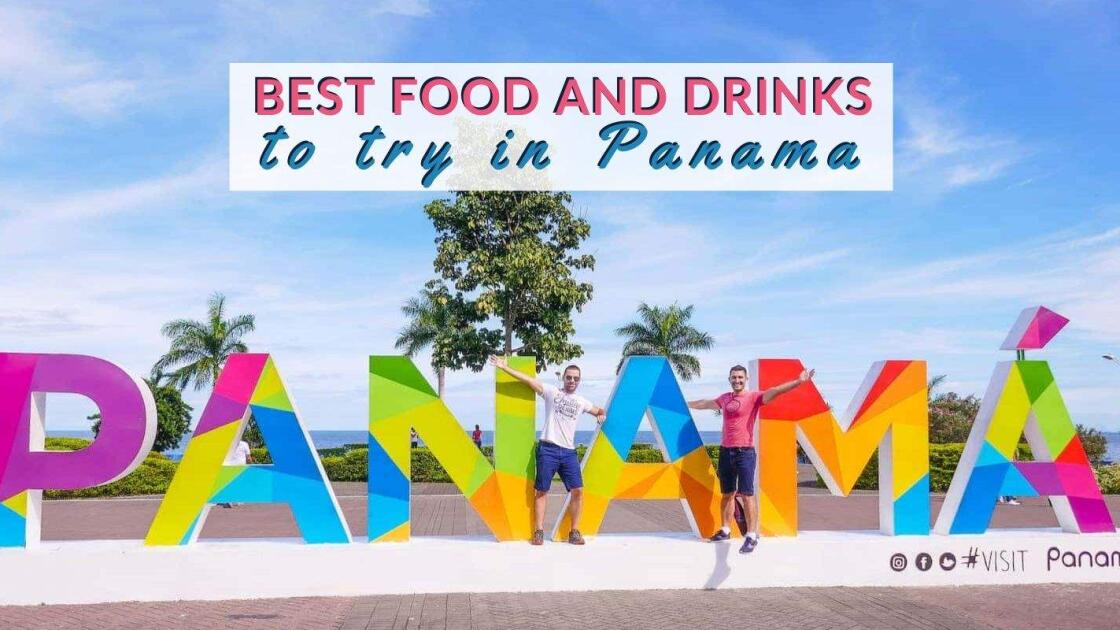

Ana
Sunday 25th of April 2021
Your blog is interesting in that you do give a partially accurate about the origin of Panamanian cuisine. Yes, the mix of cultures arriving to Panama served to create the delicious cuisine of my country. Let us not ignore the fact that many people of African ancestry also arrived (not enslaved) during the building of canal and with them came their food; such as Jamaican cooking, also a part of Panamanian cooking. Indigenous cooking of course runs throughout all the country’s cuisine. The Beauty of Panamanian food is that it is not as colonized as some might think.
Stefan Arestis
Sunday 25th of April 2021
Thanks for that!
Kathya Perez
Saturday 24th of April 2021
I have to add Arroz con Pollo is one of our signature dishes. Thank you again for telling the world about our little paradise.
Stefan Arestis
Sunday 25th of April 2021
Can't wait to try it :)
Kathya Perez
Saturday 24th of April 2021
I love your words about my beloved country. Thank you so much.
Stefan Arestis
Sunday 25th of April 2021
Thanks for reading :)
Gloriela Philpotts
Monday 15th of March 2021
You left out the West Indian or Caribbean people who labored to build the canal. They contributed some of the best loved foods. Plaintain tarts, patties, sorrel, bun, souse, and more.
Stefan Arestis
Monday 15th of March 2021
Thanks a lot for pointing that out!
Vicente
Saturday 13th of March 2021
How are you? You completely forgot food from the Atlantic side of the country. Arroz con coco , souse , rice and peas ,one pot bum and cheese . Most important arroz con pollo.
Stefan Arestis
Saturday 13th of March 2021
Noted! Thanks for telling us Vicente :)